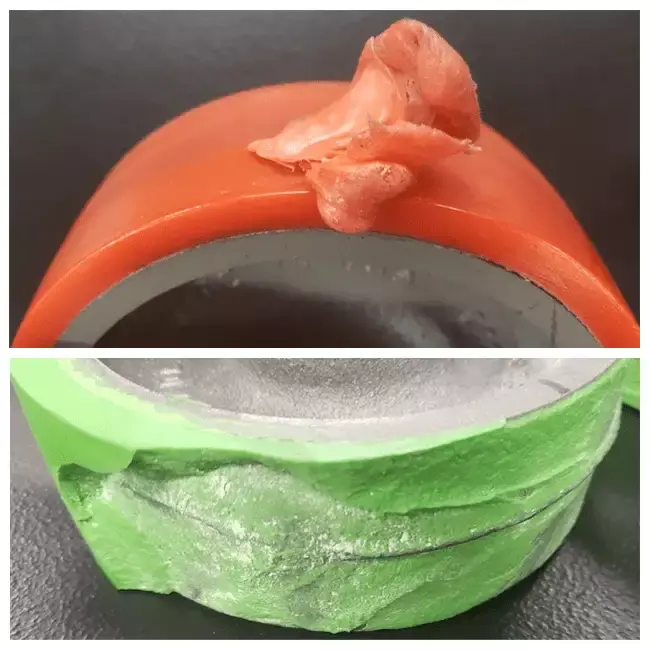

Polyurethane wheels have many benefits like non-marking on surfaces and extreme load capacity. However, using poly wheels outside their rated limits can cause them to fail.
Overloading and Overheating are the two main reasons polyurethane wheels fail. The third type of failure (rarely happens) is a bond failure. Below, I will cover these types of failures and their causes. Knowing why a wheel has failed is a critical step in selecting a wheel that will meet your performance requirements in the future.
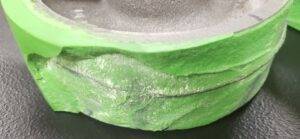
They begin to fail when polyurethane wheels carry too much weight or shock loads exceed the polyurethane rating. The internal stresses in the poly create small tears. This failure usually doesn’t happen right away. Continuing to use the overloaded wheel means the tears in the poly no longer disperse the load and the stress migrates to the surrounding poly.
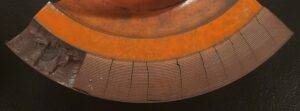
This overstressing creates more tears and breaks. This cycle of stress, tears, and breaks continues until the tears work their way through the poly and cause a failure. (Shown in Figures A & B). Different polyurethane types have different physical properties so overloading failures can look different. The material in Figure A shows internal breakage within the poly, while Figure B shows external sidewall cracking.
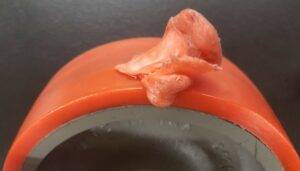
The next type of polyurethane failure happens when the material becomes too hot and melts. This occurs when the wheel runs at speeds faster than it’s rated for or is used in an environment where surrounding temperatures and speed cause it to become overheated.
Once the material becomes overheated, it begins to melt from the inside. Once the material melts and the wheel continues to be used, more poly melts until a path is made to the surface. Once the melted poly reaches the surface, the weight on the wheel forces the material out of the rolling surface or side wall. Figure C shows a wheel that became hot enough to melt the polyurethane, come out of the rolling surface, and cool back down.
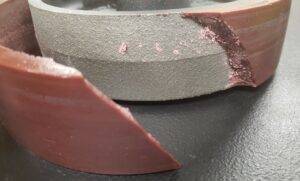
The last failure type covered is not a failure of the polyurethane material itself but a failure of the polyurethane to adhere to the wheel core material. This type of failure is less common, but understanding it will help determine why a wheel might have failed.
When polyurethane is added to a wheel core, an adhesive adheres to the two materials. This connection is called the bond, which can fail for various reasons. When a bond fails, the poly material detaches from the wheel core.
Figure D shows an extreme case where the poly material did not adhere to the wheel core in a large area. This is noticeable due to the absence of poly material on the wheel core when the poly broke free. There are varying degrees of bond failure, from the entire poly material coming off the wheel core leaving no poly material behind — to a wheel core with poly still attached everywhere except a couple of areas. Another type of bond failure can occur due to excess heat degrading the bond strength over time. The most significant factor in identifying a bond failure is looking for areas on the wheel core with no poly attached. Figure A shows what a good bond should look like when a wheel fails. As you can see, varying degrees of material thickness remain on the wheel core.
Knowing what caused a wheel to fail will help you understand what is happening in your application. This will help our material handling consultants determine what wheel and tread material should be used to replace a failed wheel. Choosing an ISO 9001-2015 certified quality wheel manufacturer is also important. Caster Concepts selects processes and pours our polyurethane in-house to ensure quality and mitigate these failures.
If you have any other questions regarding poly failure, please contact your Caster Concepts Representative.